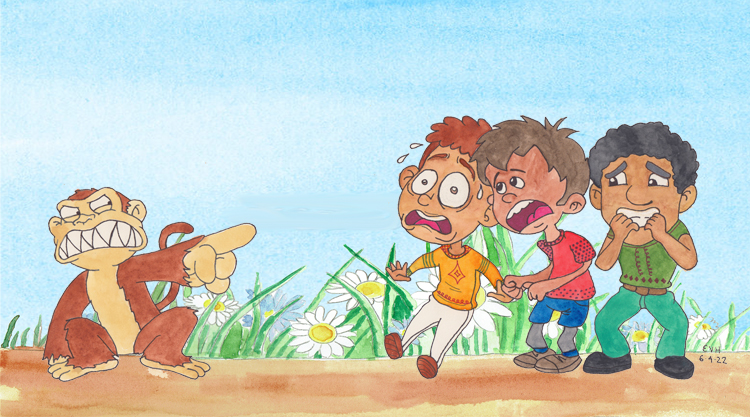
Jataka 329
Kālabāhu Jātaka
The Monkey Kālabāhu
as told by Eric Van Horn
originally translated by H.T. Francis and R.A. Neil, Cambridge University
originally edited by Professor Edward Byles Cowell, Cambridge University
While this story is yet another opportunity to dump all over Devadatta, it is also a story about counting your blessings. Sadly, I am an expert in this area. I have often in life had good circumstances and thrown them away because I lacked gratitude. It is better to think that the glass is at least half full even if things in life are not perfect. And they hardly ever are, anyway.
There is a side note to this story. It is about the name of the Bodhisatta’s brother, which in the story is “Poṭṭhapāda.” The Poṭṭhapāda Sutta (DN 9) is very popular among some of the senior monks and nuns I have known. It was a particular favorite of the legendary nun Ayya Khema.
“Once we enjoyed.” The Master told this story while living in the Bamboo Grove (Veluvana). It is about Devadatta’s loss of gain and honor. Devadatta had unreasonably developed a grudge against the Buddha and enlisted a band of archers to kill him. His offence became known when he unleashed the elephant Nālāgiri to attack the Master. Then men took away his position and prestige and the alms food provided for him, and the King ceased to honor him. And having lost his position of gain and honor, he went about living on what he could obtain from wealthy families. The monks discussed this in the Dharma Hall, how Devadatta got gain and honor, but once he had it, he could not keep it. The Master came and asked what was the subject the monks were discussing. When they told him he said, “Not only now, monks, but formerly, too, Devadatta was deprived of his gain and honor.” And he then told them this story from the past.
Once upon a time when Dhanaiñjaya was reigning in Benares, the Bodhisatta was reborn as a parrot named Rādha. He was a well-grown bird with perfectly formed limbs. And his younger brother was called Poṭṭhapāda. A fowler trapped these two birds and brought them as a present to the King of Benares. The King put the pair in a golden cage and took care of them. He gave them honey and parched corn to eat in a golden dish, and they also were given sugar water to drink. Great care was given to them, and they attained to the highest degree of profit and honor.
Then a certain forester brought a big black monkey named Kālabāhu as a present to the King. And because he was newer to the King than the parrots, he received greater gain and respect. And the attention given to the parrots dropped off. The Bodhisatta, because he possessed the qualities of a Buddha, did not say a word. But his younger brother did not have these qualities. And being unable to put up with the honor paid to the monkey, he said, “Brother, formerly in this royal house men gave us savory food, but now we get nothing. They offer it all to the monkey Kālabāhu. As we receive neither gain nor honor in this place from the King. What are we to do? Come, let us go and live in the forest.” And as he talked with him, he uttered the first stanza:
Once we enjoyed of food abundant store,
This monkey now has what was ours before.
Come, Rādha, let us to the forest fly,
Such scurvy treatment what can justify?
Rādha, on hearing this, replied in the second stanza:
Gain and loss and praise and blame,
Pleasure, pain, dishonor, fame,
All as transient states conceive,
Why should Poṭṭhapāda grieve?
On hearing this, Poṭṭhapāda was unable to get rid of his grudge against the monkey and repeated the third stanza:
Rādha, wisest bird alive,
Sure thou knowest things to come,
This vile creature who shall drive
From the court to his old home?
Rādha, on hearing this, uttered the fourth stanza:
Soon will his puckered face and moving ears
The royal children fill with foolish fears.
Soon Kālabāhu through some impish freak,
Far, far away his food will have to seek.
In a very short time the monkey—by shaking his ears and using similar tricks—terrified the young princes. In their alarm they cried out. The King asked what it meant, and on hearing the cause, he said, “Drive him away.” So he had the monkey driven away, and the parrots were restored to their former condition of gain and honor.

Figure: “Not a smart move”
The Master here ended his lesson and identified the birth: “At that time Devadatta was Kālabāhu, Ānanda was Poṭṭhapāda, and I was Rādha.”
